

Exposing The Financial Core of the Transnational Capitalist Class. Exposing The Financial Core of the Transnational Capitalist Class By Peter Phillips and Brady Osborne September 22, 2013 "Information Clearing House - Media Freedom Foundation/Project Censored has just finish a year long study on the people on the boards of directors of the top ten asset management firms and the top ten most centralized corporations in the world.
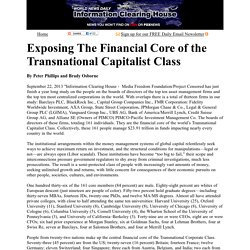
With overlaps there is a total of thirteen firms in our study: Barclays PLC, BlackRock Inc., Capital Group Companies Inc., FMR Corporation: Fidelity Worldwide Investment, AXA Group, State Street Corporation, JPMorgan Chase & Co., Legal & General Group PLC (LGIMA), Vanguard Group Inc., UBS AG, Bank of America/Merrill Lynch, Credit Suisse Group AG, and Allianz SE (Owners of PIMCO) PIMCO-Pacific Investment Management Co. Welcome - English. Introduction and important hints!
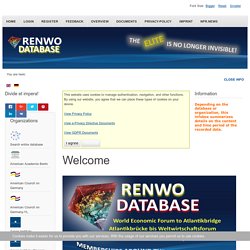
Currently: 78.462 records - 37 organizations This database cannot claim to be complete. It took months to collect and process the data and fragments now available. We are constantly working on completing or supplementing these data as far as possible. Several missing organisations will be uploaded in the coming months. Global Power Project, Part 1: Exposing the Transnational Capitalist Class. A giant mansion right below the Chapel of the Rocks in Sedona, Arizona.
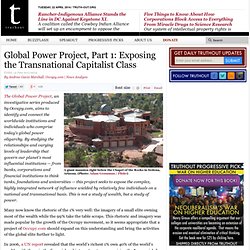
(Photo: Adam Gessaman / Flickr)The Global Power Project, an investigative series produced by Occupy.com, aims to identify and connect the worldwide institutions and individuals who comprise today's global power oligarchy. By studying the relationships and varying levels of leadership that govern our planet's most influential institutions — from banks, corporations and financial institutions to think tanks, foundations and universities — this project seeks to expose the complex, highly integrated network of influence wielded by relatively few individuals on a national and transnational basis. This is not a study of wealth, but a study of power. Wenn 147 Konzerne die ganze Wirtschaft kontrollieren - News Wirtschaft: Unternehmen. ETH-Forscher aus dem Bereich Systemdesign haben den globalen Kapitalismus mit den Methoden der modernen Systemtherorie unter die Lupe genommen.
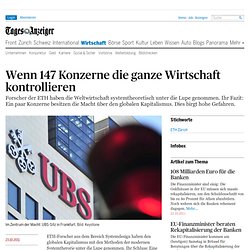
Ihr Schluss: Eine kleine Gruppe von 147 Firmen kontrolliert den Grossteil der übrigen Wirtschaft. Die Forscher filterten aus der Datenbank Orbis – diese enthält die Einträge von rund 37 Millionen Firmen – etwas mehr als 43'000 multinationale Konzerne heraus, welche durch wechselseitige Aktienbesitze vernetzt sind. Gemäss «SonntagsZeitung» stiessen die Systemtheoretiker bei der weiteren Analyse von Besitz- und Machtverhältnissen auf einen Kern von 1318 Firmen, die dank Aktien grosse Teile der Realwirtschaft kontrollieren. Finanzinstitute im Zentrum Damit waren die Forscher noch nicht im effektiven Zentrum der Machtkonzentration angelangt.
Ebenfalls spannend: Rund drei Viertel der Mitglieder der Super-Einheit gehören der Finanzindustrie an. The capitalist network that runs the world - physics-math - 19 October 2011. AS PROTESTS against financial power sweep the world this week, science may have confirmed the protesters' worst fears.
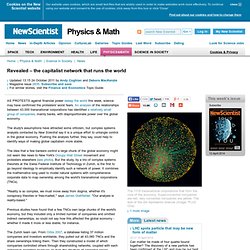
An analysis of the relationships between 43,000 transnational corporations has identified a relatively small group of companies, mainly banks, with disproportionate power over the global economy. The study's assumptions have attracted some criticism, but complex systems analysts contacted by New Scientist say it is a unique effort to untangle control in the global economy. Pushing the analysis further, they say, could help to identify ways of making global capitalism more stable. The idea that a few bankers control a large chunk of the global economy might not seem like news to New York's Occupy Wall Street movement and protesters elsewhere (see photo). Global corporate control. Who Runs The World? Solid Proof That a Core Group Of Wealthy Elites Is Pulling the Strings. By Michael SnyderActivist Post Does a shadowy group of obscenely wealthy elitists control the world?
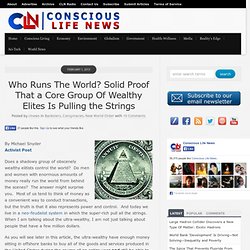
Do men and women with enormous amounts of money really run the world from behind the scenes? The answer might surprise you. Most of us tend to think of money as a convenient way to conduct transactions, but the truth is that it also represents power and control. And today we live in a neo-feudalist system in which the super-rich pull all the strings. As you will see later in this article, the ultra-wealthy have enough money sitting in offshore banks to buy all of the goods and services produced in the United States during the course of an entire year and still be able to pay off the entire U.S. national debt. Under this neo-feudalist system, all the rest of us are debt slaves, including our own governments.
The ultra-wealthy don’t run down and put their money in the local bank like you and I do. U.S. But as I mentioned previously, the global elite just don’t have a lot of money. 1. Mr. Rubikon - Magazin für die kritische Masse. Zur Untersuchung der bestehenden Machtbeziehungen, wie sie für die globale Gesellschaft von Bedeutung sind, schlug ich bereits früher einen analytischen Bezugsrahmen vor und sprach dabei folgende Fragen an: Wie ist die global herrschende Klasse im Inneren strukturiert?
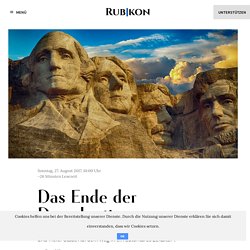
Ist es theoretisch korrekt, für die Gruppe der Herrschenden den Begriff Klasse zu verwenden? Welches sind die wichtigsten Instrumente, mit denen sie ihre Macht ausübt? Stark beeinflusst von C. Wright Mills’ klassischem Werk The Power Elite, hat die neue Machtstrukturforschung ein idealtypisches Modell mit vier konzentrischen Kreisen entwickelt: